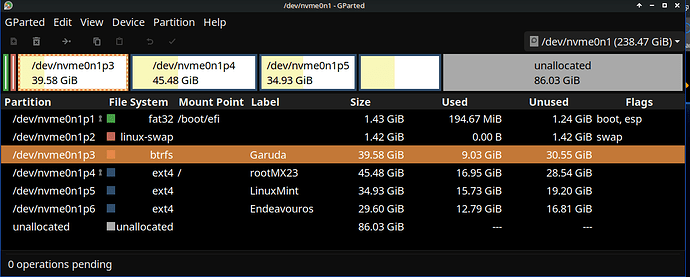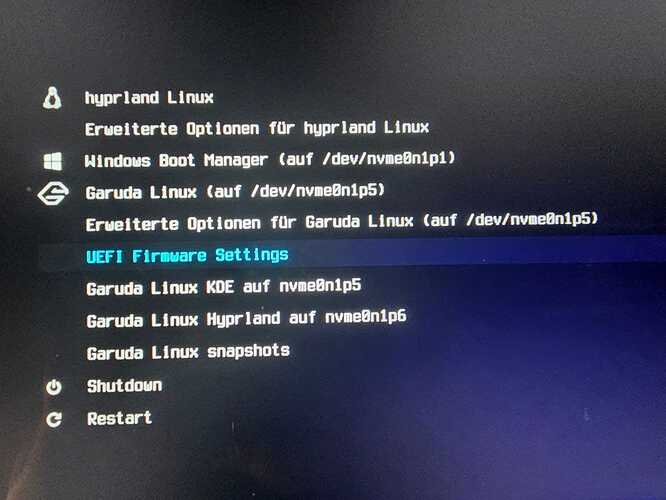Hello,
Is it possible to recover grub without the installation USB? I do not know what I did wrong but I do not have access to the system since I have no grub, I get the black screen says something and ends at the end in ‘grub’ …
Thanks
This is from another post, since i’m right now in LinuxMint:
╭─alnone@alnone in ~ took 7ms
╰─λ inxi -Faz
System:
Kernel: 6.6.21-1-lts arch: x86_64 bits: 64 compiler: gcc v: 13.2.1
clocksource: tsc avail: acpi_pm
parameters: BOOT_IMAGE=/@/boot/vmlinuz-linux-lts
root=UUID=91c0a886-25fe-452a-b52b-00f0e5b90cbe rw rootflags=subvol=@
quiet loglevel=3 ibt=off
Desktop: Xfce v: 4.18.1 tk: Gtk v: 3.24.36 wm: xfwm4 v: 4.18.0
with: xfce4-panel tools: xfce4-screensaver avail: xautolock vt: 7
dm: LightDM v: 1.32.0 Distro: Garuda base: Arch Linux
Machine:
Type: Laptop System: Dell product: Inspiron 3583 v: N/A
serial: <superuser required> Chassis: type: 10 serial: <superuser required>
Mobo: Dell model: 0WHCP7 v: A00 serial: <superuser required> part-nu: 08CA
uuid: <superuser required> UEFI: Dell v: 1.5.1 date: 05/30/2019
Battery:
ID-1: BAT0 charge: 39.9 Wh (100.0%) condition: 39.9/42.0 Wh (95.0%)
volts: 12.6 min: 11.4 model: SMP DELL VM73283 type: Li-poly serial: <filter>
status: full
CPU:
Info: model: Intel Core i5-8265U bits: 64 type: MT MCP
arch: Comet/Whiskey Lake note: check gen: core 8 level: v3 note: check
built: 2018 process: Intel 14nm family: 6 model-id: 0x8E (142)
stepping: 0xC (12) microcode: 0xFA
Topology: cpus: 1x cores: 4 tpc: 2 threads: 8 smt: enabled cache:
L1: 256 KiB desc: d-4x32 KiB; i-4x32 KiB L2: 1024 KiB desc: 4x256 KiB
L3: 6 MiB desc: 1x6 MiB
Speed (MHz): avg: 800 min/max: 400/3900 scaling: driver: intel_pstate
governor: powersave cores: 1: 800 2: 800 3: 800 4: 800 5: 800 6: 800 7: 800
8: 800 bogomips: 28808
Flags: avx avx2 ht lm nx pae sse sse2 sse3 sse4_1 sse4_2 ssse3 vmx
Vulnerabilities:
Type: gather_data_sampling mitigation: Microcode
Type: itlb_multihit status: KVM: VMX disabled
Type: l1tf status: Not affected
Type: mds status: Not affected
Type: meltdown status: Not affected
Type: mmio_stale_data mitigation: Clear CPU buffers; SMT vulnerable
Type: retbleed mitigation: Enhanced IBRS
Type: spec_rstack_overflow status: Not affected
Type: spec_store_bypass mitigation: Speculative Store Bypass disabled via
prctl
Type: spectre_v1 mitigation: usercopy/swapgs barriers and __user pointer
sanitization
Type: spectre_v2 mitigation: Enhanced / Automatic IBRS, IBPB:
conditional, RSB filling, PBRSB-eIBRS: SW sequence
Type: srbds mitigation: Microcode
Type: tsx_async_abort status: Not affected
Graphics:
Device-1: Intel WhiskeyLake-U GT2 [UHD Graphics 620] vendor: Dell
driver: i915 v: kernel arch: Gen-9.5 process: Intel 14nm built: 2016-20
ports: active: eDP-1 empty: HDMI-A-1 bus-ID: 00:02.0 chip-ID: 8086:3ea0
class-ID: 0300
Device-2: Realtek Integrated_Webcam_HD driver: uvcvideo type: USB rev: 2.0
speed: 480 Mb/s lanes: 1 mode: 2.0 bus-ID: 1-6:3 chip-ID: 0bda:5520
class-ID: 0e02 serial: <filter>
Display: x11 server: X.Org v: 21.1.11 compositor: xfwm4 v: 4.18.0 driver:
X: loaded: modesetting alternate: fbdev,intel,vesa dri: iris gpu: i915
display-ID: :0.0 screens: 1
Screen-1: 0 s-res: 1366x768 s-dpi: 96 s-size: 361x203mm (14.21x7.99")
s-diag: 414mm (16.31")
Monitor-1: eDP-1 model: AU Optronics 0x10ec built: 2017 res: 1366x768
hz: 60 dpi: 101 gamma: 1.2 size: 344x193mm (13.54x7.6") diag: 394mm (15.5")
ratio: 16:9 modes: 1366x768
API: Vulkan v: 1.3.279 layers: 5 device: 0 type: integrated-gpu name: Intel
UHD Graphics 620 (WHL GT2) driver: mesa intel v: 24.0.2-arch1.2
device-ID: 8086:3ea0 surfaces: xcb,xlib device: 1 type: cpu name: llvmpipe
(LLVM 17.0.6 256 bits) driver: mesa llvmpipe v: 24.0.2-arch1.2 (LLVM
17.0.6) device-ID: 10005:0000 surfaces: xcb,xlib
API: OpenGL Message: Unable to show GL data. glxinfo is missing.
Audio:
Device-1: Intel Cannon Point-LP High Definition Audio vendor: Dell
driver: snd_hda_intel v: kernel alternate: snd_soc_skl,snd_sof_pci_intel_cnl
bus-ID: 00:1f.3 chip-ID: 8086:9dc8 class-ID: 0403
API: ALSA v: k6.6.21-1-lts status: kernel-api tools: N/A
Server-1: PipeWire v: 1.0.3 status: active with: 1: pipewire-pulse
status: active 2: wireplumber status: active 3: pipewire-alsa type: plugin
4: pw-jack type: plugin tools: pactl,pw-cat,pw-cli,wpctl
Network:
Device-1: Realtek RTL810xE PCI Express Fast Ethernet vendor: Dell
driver: r8169 v: kernel pcie: gen: 1 speed: 2.5 GT/s lanes: 1 port: 3000
bus-ID: 01:00.0 chip-ID: 10ec:8136 class-ID: 0200
IF: enp1s0 state: up speed: 100 Mbps duplex: full mac: <filter>
Info: services: NetworkManager,systemd-timesyncd
Drives:
Local Storage: total: 238.47 GiB used: 23.19 GiB (9.7%)
SMART Message: Required tool smartctl not installed. Check --recommends
ID-1: /dev/nvme0n1 maj-min: 259:0 vendor: Western Digital
model: PC SN520 NVMe WDC 256GB size: 238.47 GiB block-size: physical: 512 B
logical: 512 B speed: 15.8 Gb/s lanes: 2 tech: SSD serial: <filter>
fw-rev: 20200012 temp: 35.9 C scheme: GPT
Partition:
ID-1: / raw-size: 48.48 GiB size: 48.48 GiB (100.00%) used: 7.69 GiB (15.9%)
fs: btrfs dev: /dev/nvme0n1p5 maj-min: 259:5
ID-2: /boot/efi raw-size: 1.43 GiB size: 1.43 GiB (99.80%)
used: 27.1 MiB (1.9%) fs: vfat dev: /dev/nvme0n1p1 maj-min: 259:1
ID-3: /home raw-size: 48.48 GiB size: 48.48 GiB (100.00%)
used: 7.69 GiB (15.9%) fs: btrfs dev: /dev/nvme0n1p5 maj-min: 259:5
ID-4: /var/log raw-size: 48.48 GiB size: 48.48 GiB (100.00%)
used: 7.69 GiB (15.9%) fs: btrfs dev: /dev/nvme0n1p5 maj-min: 259:5
ID-5: /var/tmp raw-size: 48.48 GiB size: 48.48 GiB (100.00%)
used: 7.69 GiB (15.9%) fs: btrfs dev: /dev/nvme0n1p5 maj-min: 259:5
Swap:
Kernel: swappiness: 133 (default 60) cache-pressure: 100 (default) zswap: no
ID-1: swap-1 type: partition size: 1.42 GiB used: 0 KiB (0.0%)
priority: -2 dev: /dev/nvme0n1p2 maj-min: 259:2
ID-2: swap-2 type: zram size: 7.63 GiB used: 211 MiB (2.7%) priority: 100
comp: zstd avail: lzo,lzo-rle,lz4,lz4hc,842 max-streams: 8 dev: /dev/zram0
Sensors:
System Temperatures: cpu: 47.0 C pch: 46.0 C mobo: 39.0 C
Fan Speeds (rpm): cpu: 0
Info:
Memory: total: 8 GiB available: 7.63 GiB used: 3.18 GiB (41.6%)
Processes: 261 Power: uptime: 4h 12m states: freeze,mem,disk suspend: deep
avail: s2idle wakeups: 0 hibernate: platform avail: shutdown, reboot,
suspend, test_resume image: 3.04 GiB services: upowerd,xfce4-power-manager
Init: systemd v: 255 default: graphical tool: systemctl
Packages: pm: pacman pkgs: 1367 libs: 419 tools: octopi,paru pm: flatpak
pkgs: 0 Compilers: gcc: 13.2.1 Shell: Bash v: 5.2.26
running-in: xfce4-terminal inxi: 3.3.33
╭─alnone@alnone in ~ took 1s
╰─λ
Just in case, now from LinuxMint:
kaos@kaos-Inspiron-3583:~$ inxi -Faz
System:
Kernel: 5.15.0-101-generic x86_64 bits: 64 compiler: gcc v: 11.4.0
parameters: BOOT_IMAGE=/boot/vmlinuz-5.15.0-101-generic
root=UUID=7b468763-5ba5-4aff-b6e7-727f96db1283 ro quiet splash
Desktop: Xfce 4.18.1 tk: Gtk 3.24.33 info: xfce4-panel wm: xfwm 4.18.0
vt: 7 dm: LightDM 1.30.0 Distro: Linux Mint 21.3 Virginia
base: Ubuntu 22.04 jammy
Machine:
Type: Laptop System: Dell product: Inspiron 3583 v: N/A
serial: <superuser required> Chassis: type: 10 serial: <superuser required>
Mobo: Dell model: 0WHCP7 v: A00 serial: <superuser required> UEFI: Dell
v: 1.5.1 date: 05/30/2019
Battery:
ID-1: BAT0 charge: 39.9 Wh (100.0%) condition: 39.9/42.0 Wh (95.0%)
volts: 12.6 min: 11.4 model: SMP DELL VM73283 type: Li-poly
serial: <filter> status: Full
CPU:
Info: model: Intel Core i5-8265U bits: 64 type: MT MCP
arch: Comet/Whiskey Lake note: check family: 6 model-id: 0x8E (142)
stepping: 0xC (12) microcode: 0xF8
Topology: cpus: 1x cores: 4 tpc: 2 threads: 8 smt: enabled cache:
L1: 256 KiB desc: d-4x32 KiB; i-4x32 KiB L2: 1024 KiB desc: 4x256 KiB
L3: 6 MiB desc: 1x6 MiB
Speed (MHz): avg: 800 min/max: 400/3900 scaling: driver: intel_pstate
governor: powersave cores: 1: 800 2: 800 3: 800 4: 800 5: 800 6: 800 7: 800
8: 800 bogomips: 28800
Flags: avx avx2 ht lm nx pae sse sse2 sse3 sse4_1 sse4_2 ssse3 vmx
Vulnerabilities:
Type: gather_data_sampling mitigation: Microcode
Type: itlb_multihit status: KVM: VMX disabled
Type: l1tf status: Not affected
Type: mds status: Not affected
Type: meltdown status: Not affected
Type: mmio_stale_data mitigation: Clear CPU buffers; SMT vulnerable
Type: retbleed mitigation: Enhanced IBRS
Type: spec_rstack_overflow status: Not affected
Type: spec_store_bypass
mitigation: Speculative Store Bypass disabled via prctl and seccomp
Type: spectre_v1
mitigation: usercopy/swapgs barriers and __user pointer sanitization
Type: spectre_v2 mitigation: Enhanced IBRS, IBPB: conditional, RSB
filling, PBRSB-eIBRS: SW sequence
Type: srbds mitigation: Microcode
Type: tsx_async_abort status: Not affected
Graphics:
Device-1: Intel WhiskeyLake-U GT2 [UHD Graphics 620] vendor: Dell
driver: i915 v: kernel ports: active: eDP-1 empty: HDMI-A-1 bus-ID: 00:02.0
chip-ID: 8086:3ea0 class-ID: 0300
Device-2: Realtek Integrated_Webcam_HD type: USB driver: uvcvideo
bus-ID: 1-6:3 chip-ID: 0bda:5520 class-ID: 0e02 serial: <filter>
Display: x11 server: X.Org v: 1.21.1.4 compositor: xfwm v: 4.18.0 driver:
X: loaded: modesetting unloaded: fbdev,vesa gpu: i915 display-ID: :0.0
screens: 1
Screen-1: 0 s-res: 1366x768 s-dpi: 96 s-size: 361x203mm (14.2x8.0")
s-diag: 414mm (16.3")
Monitor-1: eDP-1 model: AU Optronics built: 2017 res: 1366x768 hz: 60
dpi: 101 gamma: 1.2 size: 344x193mm (13.5x7.6") diag: 394mm (15.5")
ratio: 16:9 modes: 1366x768
OpenGL: renderer: Mesa Intel UHD Graphics 620 (WHL GT2)
v: 4.6 Mesa 23.2.1-1ubuntu3.1~22.04.2 direct render: Yes
Audio:
Device-1: Intel Cannon Point-LP High Definition Audio vendor: Dell
driver: snd_hda_intel v: kernel alternate: snd_sof_pci_intel_cnl
bus-ID: 00:1f.3 chip-ID: 8086:9dc8 class-ID: 0403
Sound Server-1: ALSA v: k5.15.0-101-generic running: yes
Sound Server-2: PulseAudio v: 15.99.1 running: yes
Sound Server-3: PipeWire v: 0.3.48 running: yes
Network:
Device-1: Realtek RTL810xE PCI Express Fast Ethernet vendor: Dell
driver: r8169 v: kernel pcie: gen: 1 speed: 2.5 GT/s lanes: 1 port: 3000
bus-ID: 01:00.0 chip-ID: 10ec:8136 class-ID: 0200
IF: enp1s0 state: up speed: 100 Mbps duplex: full mac: <filter>
Drives:
Local Storage: total: 238.47 GiB used: 14.53 GiB (6.1%)
SMART Message: Required tool smartctl not installed. Check --recommends
ID-1: /dev/nvme0n1 maj-min: 259:0 vendor: Western Digital
model: PC SN520 NVMe WDC 256GB size: 238.47 GiB block-size: physical: 512 B
logical: 512 B speed: 15.8 Gb/s lanes: 2 type: SSD serial: <filter>
rev: 20200012 temp: 44.9 C scheme: GPT
Partition:
ID-1: / raw-size: 34.93 GiB size: 34.08 GiB (97.58%)
used: 14.34 GiB (42.1%) fs: ext4 dev: /dev/nvme0n1p5 maj-min: 259:5
ID-2: /boot/efi raw-size: 1.43 GiB size: 1.43 GiB (99.80%)
used: 191.8 MiB (13.1%) fs: vfat dev: /dev/nvme0n1p1 maj-min: 259:1
Swap:
Kernel: swappiness: 60 (default) cache-pressure: 100 (default)
ID-1: swap-1 type: partition size: 1.42 GiB used: 0 KiB (0.0%)
priority: -2 dev: /dev/nvme0n1p2 maj-min: 259:2
Sensors:
System Temperatures: cpu: 25.0 C pch: 40.0 C mobo: N/A
Fan Speeds (RPM): cpu: 0
Info:
Processes: 263 Uptime: 28m wakeups: 1 Memory: 7.63 GiB
used: 1.95 GiB (25.6%) Init: systemd v: 249 runlevel: 5 tool: systemctl
Compilers: gcc: 11.4.0 alt: 11/12 clang: 14.0.0-1ubuntu1.1 Packages:
apt: 2725 lib: 1628 Shell: Bash v: 5.1.16 running-in: xfce4-terminal
inxi: 3.3.13
kaos@kaos-Inspiron-3583:~$

